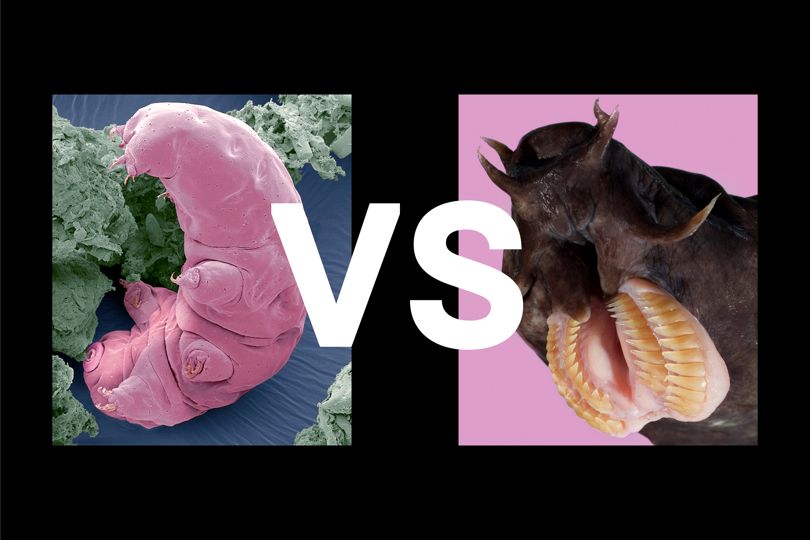!!!Tartigrade Vs Hagfish!!! Fight!!
Animals are awesome. But which is the ultimate champion? Get ready to pitt some of nature’s most remarkable creatures against one another in a series of virtual battles. Two animals per week, head-to-head, in a ruthless knockout tournament. Decide who wins!

Left: the hardy, teeny-tiny tardigrade. Right: the ghoulish hagfish
This isn’t a battle in the conventional sense – after all, how can you judge a fight between a tardigrade and a hagfish? We want you to vote for the animal you think is the most amazing, the most hardcore, the cutest, the ugliest, the deadliest, the weirdest.
Tardigrade
Killer feature: Probably the most resilient animal on Earth
Special ability: Can survive temperatures as low as −272°C and as high as 150°C
Location: Everywhere. Even the vacuum of space
Schokraie E, Warnken U, Hotz-Wagenblatt A, Grohme MA, Hengherr S, et al. (2012)
Also known as water bears, space bears, or moss piglets, tardigrades (that’s “slow stepper” in Italian) typically live in damp moss or lichens. These indestructible little critters measure between 0.05mm and 1.2mm and look a bit like piglets or manatees. They’ve been found alive and well 6,000 metres up a mountain and 3,000 metres down at the bottom of the ocean. In 2007, a posse of tardigrades spent ten days in the vacuum of space on the outside of a Space Shuttle. They’re the only known animals that can survive in such extreme conditions. Oh, and they can enter a period of suspended animation and be brought back to life after hundreds of years. Which, given the state of the world right now, is always handy.
All this makes the plucky tardigrade pretty much impossible to kill. You can’t crush them – tardigrades can survive atmospheric pressures 6,000 times greater than those at the bottom of the Mariana Trench. You also can’t irradiate them... they just repair their DNA and keep on truckin’. They can go without food or water for more than 30 years and are found in fossil records dating back 520 million years. They've changed very little in that time – after all, why meddle with perfection? In a simulation run by scientists at the universities of Harvard and Oxford – which pelted Earth and killer asteroids, supernovae and gamma-ray bursts, tardigrades outlived ten billion years’ worth of cataclysms. Only when the Sun fails, engulfing the Earth in a wave of unimaginable destruction, will tardigrades finally run out of places to hide.
Hagfish
Killer feature: Eats decaying corpses from the inside out
Special ability: Produces loads of slime to suffocate its prey and then slip away quickly
Location: Found on the sea floor all over the world
Oh this? This is just what I use to suffocate my prey before I burrow my way into its anus.
Hagfish, also known as slime eels, are a species of slimy, flesh-eating worm-fish that hang out on the ocean floor. They’re the only animals still alive that have a skull but no spine. But don’t call them spineless to their faces, because they like to kill their prey – usually fish – by drenching them in a thick, sticky mucus that clogs up their gills until they suffocate. A truckload of hagfish once crashed on an Oregon highway, drenching the road in their peculiar effluence.
These fish also have somewhat unsavoury eating habits. They like to burrow through the anus of dead sharks and eat them from the inside out, tearing chunks off with their weird, tooth-like appendages. Despite this, hagfish are far from heartless. They actually have four – one main heart and three extra ones that help the blood make it all the way round their bodies. This primitive circulatory system is probably something to do with the fact that the species has barely evolved over the last 300 million years. Ancient hagfish fossils are nearly identical to their fearsome modern-day relatives.
Credit: Wired
For more interesting finds/ posts Please Follow Me=D
upvote to help me in the struggle!
Thank you everyone!!!!!!